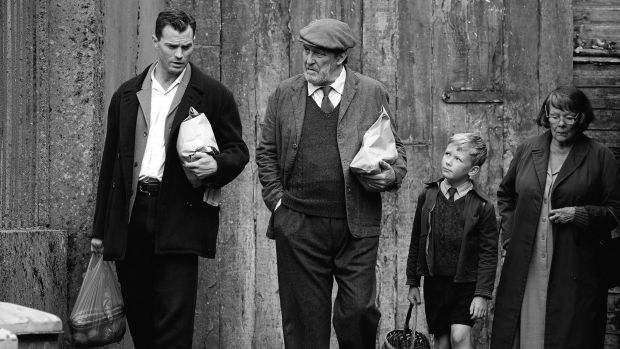MICHAEL WOLSEY: Sad, funny and soulful – but it’s just not Belfast

Like Kenneth Branagh, Belfast is my native city. Like Branagh, I was living there in 1969 when the Troubles began and, like Branagh, I left shortly after.
Like Branagh, I was raised in the Protestant community. But my memory of the city in the late 1960s is very different from the one displayed in his loosely autobiographical film, Belfast .
The movie, which has been nominated for seven Oscars, was shot in black and white but the film-maker must have been looking through rose-tinted glasses.
Branagh was, of course, creating entertainment, not a documentary. Even so, some of the scenes are jarringly inaccurate.
Nobody danced between the barricades on Belfast’s terraced streets and the watch was not kept by comatose old men who woke from their naps to exchange a few pleasantries with the neighbours.
The barricades were ten-feet high, built across the entrance to Catholic streets because Protestants from the other side of the main road were trying to burn “the fenians” out of house and home.
Too late for Bombay Street. It had already been destroyed by a rampage similar, but much worse, than the one which opens Branagh’s film.
It’s not clear who is rioting on Branagh’s fictional street but I know who attacked Bombay Street. It was loyalists from across the Shankill, helped by B Specials out of uniform and abetted by some RUC officers in uniform.
So no, nobody was dancing between the barricades. And nobody was dancing to a jazz band in a local hall after a funeral. Not a Protestant funeral, or any other sort of funeral for that matter. You’d have been hard put to find a jazz band in Belfast in the 1960s, never mind hire one to entertain mourners.
Buddy, the character who represents nine-year-old Branagh in the film, has a primary school infatuation for a girl and fears he may never get to marry her because she is a Catholic.
In the Belfast of 1969 that would not have been a problem because they would never have been at the same school in the first place.
Even today, the situation is unlikely. There is some integrated education in posh Belfast suburbs like Malone and Stranmillis. But on loyalist Sandy Row, say, or what remains of the Shankill, a modern Buddy is as likely to be sharing a classroom with a child from the royal family as he is with a nine-year-old Catholic.
All the characters in Belfast, the movie, sound like they would be at home in Stranmillis or Malone, except Judi Dench, whose Irish accent seems to have been shaped a bit further south. The others are all rather well-spoken, not polite English like Kenneth Branagh, but polite Belfast.
That’s understandable – which is more than can be said for the real accent. Working class Belfast speaks a language that the stranger does not know, difficult for an audience in Holywood, Co Down, never mind Hollywood, California.
Does any of this really matter? Maybe not. Not for most film critics and cinema audiences and not, I hope, for the Academy Award judges.
The city where I grew up – the grey, divided city of smokey bars, gospel halls, dole queues and beaten dockets – was not short of character and characters, of grit, humour and courage. It was a city with a story, but not the sort of story that gets nominated for seven Oscars.
Kenneth Branach did once feature in a screen drama that reflected the real Belfast of the 1970s. He played the teenager, Billy, in a trilogy of plays written for the BBC by Graham Reid. The Troubles were the background, but not a major part of the story, which was set around a dysfunctional Protestant family in a loyalist area. Like Branagh’s new Belfast it was sometimes funny and could at times be very touching. But it was also dirty, steeped in drink and with violence – personal, not paramilitary – always simmering and sometimes exploding. Now that Branagh has put the city back on the world stage it would be good if the BBC would show the trilogy again. Firstly because they were great plays but, also, to provide a bit of balance.
I hope Branagh’s movie wins Oscars. He has made a lovely film that tugs at the heartstrings. The acting is great and the family he puts on screen has charm, warmth and humour along with normal human weaknesses. Van Morrison’s soulful music makes a brilliant soundtrack.
It’s great stuff. But it’s not Belfast.




